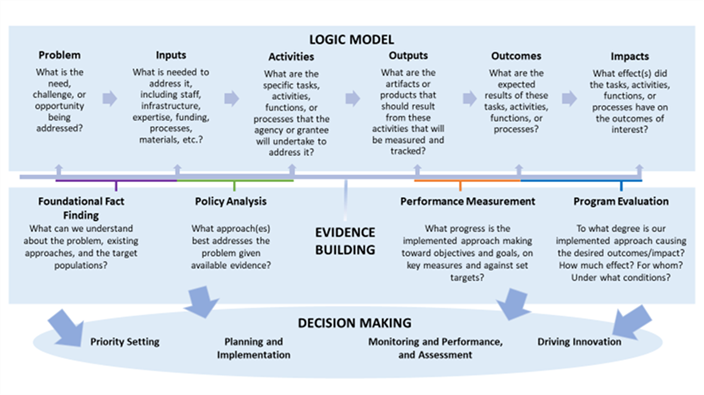September 27, 2021
OMB M-21-27: Guidance worth getting excited about
By The Evidence Team, OMB
 It’s not often that OMB guidance and evidence-based policymaking generate media buzz, especially not together. But, the recent release of OMB M-21-27, responding to the January, 2021 Presidential Memorandum on Restoring Trust in Government Through Scientific Integrity and Evidence-Based Policymaking did just that! (Reference Links) This guidance builds on previous OMB guidance on Learning Agendas and Annual Evaluation Plans (see OMB M-19-23, OMB M-20-12, and A-11 Section 290), and highlights the ways in which evidence-building - especially evaluation - is critical for an evidence-based government. It provides new details on important topics such as engaging those who support, receive, or otherwise have a connection to government policies and programs, and transparency in how the government builds and uses evidence, while addressing key Administration priorities like equity and the COVID-19 response. It clearly directs agencies to use evidence to support their missions and operations and commit to building that evidence where it’s lacking. It also sends a strong signal that evidence-based policymaking isn’t just for the big agencies; it should be a priority for all agencies from top to bottom.
It’s not often that OMB guidance and evidence-based policymaking generate media buzz, especially not together. But, the recent release of OMB M-21-27, responding to the January, 2021 Presidential Memorandum on Restoring Trust in Government Through Scientific Integrity and Evidence-Based Policymaking did just that! (Reference Links) This guidance builds on previous OMB guidance on Learning Agendas and Annual Evaluation Plans (see OMB M-19-23, OMB M-20-12, and A-11 Section 290), and highlights the ways in which evidence-building - especially evaluation - is critical for an evidence-based government. It provides new details on important topics such as engaging those who support, receive, or otherwise have a connection to government policies and programs, and transparency in how the government builds and uses evidence, while addressing key Administration priorities like equity and the COVID-19 response. It clearly directs agencies to use evidence to support their missions and operations and commit to building that evidence where it’s lacking. It also sends a strong signal that evidence-based policymaking isn’t just for the big agencies; it should be a priority for all agencies from top to bottom.
“OMB M-21-27 is a welcome tool to engage our stakeholders. It captures the essence of the shift that the Evidence Act seeks to achieve to promote Government effectiveness and efficiency. It explains—with remarkable clarity—the value of strategic planning to use scarce resources for continuous improvement. At NSF, engaging our stakeholders in this work has strengthened connections across units that are generating efficiencies and enhancing the potential value of the evidence-building activities we are planning.”
- Clemencia Cosentino, Evaluation Officer at the National Science Foundation
This guidance aims to both accelerate the good work already happening in agencies and kick-start efforts in other places. Agency leaders and staff should review the guidance and think critically about how they can and should use its requirements to better deliver on their mission. You may be thinking, “how does this apply to me?” Evidence-based policymaking isn’t just for the research and evaluation staff – it’s for everyone! This guidance shows how and why evidence and evaluation are important regardless of where you sit in an agency, whether it’s figuring out how to improve a program that doesn’t seem to be working as well as it could or understanding how you can measure the impact of a regulation.
How did we get here? In developing this guidance, we (the OMB Evidence Team) engaged a wide range of experts throughout the drafting process to make it as responsive as possible to the community’s needs. We held listening sessions with members of the Evaluation Officer Council, other Federal evaluation leaders, and external representatives from foundations, non-profits, academia, industry groups, and research firms. In doing so, we wanted to lead by example and demonstrate the type of meaningful engagement that agencies should undertake from start to finish as they develop and implement their Learning Agendas and Annual Evaluation Plans.
Listening to and considering different perspectives and views, both within and outside of the agency, is essential to shaping priority questions. As the guidance emphasizes, this kind of intentional engagement can also advance equity, help agencies avoid perpetuating underlying biases, and better meet the needs of underserved communities. To do this effectively, agencies have to go beyond the typical engagement methods and use tools like participatory research, focus groups, and one-on-one consultations, among others.
One key takeaway from OMB M-21-27 is the importance of building a culture of learning and evidence throughout the Federal Government. At its heart, evidence-based policymaking is really about culture change. Evidence Act implementation is not a compliance exercise, rather, we do this work as a means to an end.
“This is an important building block in constructing a sound evidence infrastructure. This guidance isn’t perfunctory – it really addresses the challenges and opportunities that agencies face. OMB gets it. I expect to refer to this guidance often.”
– Naomi Goldstein, Deputy Assistant Secretary for Planning, Research and Evaluation at the Department of Health and Human Services
We need to remember that evidence can and should be used in everything that government does. From processes and procedures like program and service delivery to regulatory actions to agency operations like HR and grantmaking, the goal is to make demand for and use of evidence fundamental to the way we do business. Across functions, agencies should ask questions like “what do we know?,” “what do we need to know?,” and “what methods and activities will help us answer those critical questions?”

Also of note in this guidance is the strong and unmistakable statement that program evaluation is a critical agency function that is complementary to, but distinct from, performance measurement, independent audits, and basic scientific research and development. Evaluation should not sit on the sidelines. Rather, agencies should plan for evaluation at the outset and include evaluation experts in early conversations about program design and/or changes. OMB M-21-27 makes clear that program evaluation is a scientific activity. When agencies conduct evaluation activities, they must treat them as a scientific endeavor and uphold the standards of relevance and utility, rigor, independence and objectivity, transparency, and ethics. We, as a Federal Government, can and should use evaluation to learn what’s working, what’s not, and how we can improve. This also means acknowledging failure and recognizing that null or negative results give us opportunities to learn.
“While evaluation has long been a priority in parts of our government, the new OMB guidance outlines a clear expectation that evaluation is necessary and that it is a critical aspect of effectively implementing government programs and policies. The intentional effort by OMB and the administration to recognize that evaluation is vital, even for the agencies that were not required to establish evaluation functions under the Foundations for Evidence-Based Policymaking Act, is to be applauded. The clear articulation from OMB about the role evaluative thinking and practice in improving our government will certainly lead to public services that better meet the needs of the American people.”
-Nick Hart, President of the Data Foundation
So how do we get there? To make this culture change possible, OMB expects agencies to make the critical investments needed to support evaluation, whether it’s sufficient funding, dedicated and thoughtful planning, and/or specialized staff with evaluation expertise. For program evaluation to serve as a key agency function, agencies have to go beyond the minimum and provide the resources to achieve this mission-critical function. OMB M-21-27 offers ideas about how agencies can use diversified funding sources and other tools to support their evaluation activities. The guidance also puts down a clear marker that agencies must invest in a skilled workforce with appropriate expertise, including their designated Evaluation Officer and staff. As the leader for an agency’s evaluation enterprise, the Evaluation Officer needs to be a senior career employee with the skills and expertise to maintain principles of scientific integrity throughout the evaluation process, adhere to the agency evaluation policy, and meet the evaluation standards in M-20-12.
Is the energy and enthusiasm around OMB-M-21-27 soon to fade? We sure hope not! Has this sneak peek given you a taste of what all of this excitement’s about and left you wanting more? We encourage you to read it for yourself. We may be biased, but we think this guidance is worth getting excited about. We hope you’ll read it and agree.
- More Guidance issued on Evidence-Based Policymaking Act
- OMB memo tells agencies to back up future budget requests with evidence
- OMB Offers New Guidance For Implementing First Part of Evidence Act
- Statement from the American Evaluation Association on the June 2021 WhiteHouse OMB Guidance on Evaluation and Learning Agendas
- OMB Issues New Evidence Act Guidance for Federal Agencies

